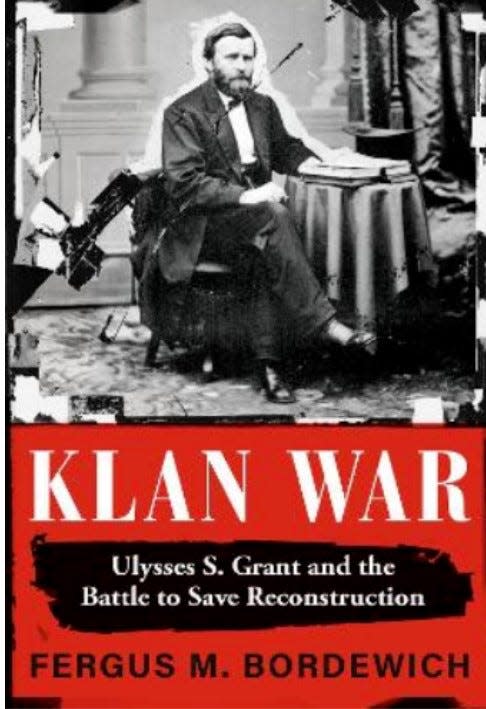Author examines the battle just after the Civil War in 'Klan War'

- Oops!Something went wrong.Please try again later.
- Oops!Something went wrong.Please try again later.
- Oops!Something went wrong.Please try again later.
The 1980s and early 1990s saw a spate of books on the subject of Why the South Lost the Civil War or Why the North Won.
Several authors noted other countries had suffered worse military defeats than the Confederacy -- the Poles, say, or the Vietnamese --- yet carried on underground resistance until achieving independence.
The historian C. Vann Woodward ("The Strange Career of Jim Crow") pointed out in the New York Review of Books that there WAS an underground resistance in the South, called the Ku Klux Klan, and that it ultimately won in 1876.
Before that, however, the Klan would battle through the two terms of President Ulysses S Grant -- and at times, it seemed as if the Klan might lose. Fergus M. Bordewich ("Congress at War") tells the story of that conflict in "Klan War," and many of its battlefields are in North Carolina.
Although a Unionist and a loyal officer, Ulysses S. Grant had at first been lukewarm to the cause of abolition. Like Lincoln, he'd married into a slaveholding family. Unlike Lincoln, he'd actually owned a slave once. (He freed the man, even at a time when Grant needed money.)
The record of the "U.S. Colored Troops," many of them ex-slaves, seems to have converted Grant to the cause of Civil Rights. He put troops back into the South to counter Klan violence, working with Republican state officials like North Carolina's Gov. William W. Holden.
Founded after the war in Pulaski, Tennessee, the Ku Klux Klan began as a sort of fraternal lodge to entertain bored veterans. (The name seems to derive from "Kuklos," Greek for "Circle," often used in the names of antebellum college fraternities. ) Soon, however, it morphed into a cabal of masked riders, intimidating any blacks who dared to vote or any white Republican who tried to help them.
As Bordewich tells it, the Klan War often seems like Civil War, Round 2. A number of ex-Confederate generals and colonels were among its leadership.
Foremost was Nathan Bedford Forrest, a pre-war slave trader from Memphis. Shelby Foote once called Forrest the greatest genius, aside from Lincoln, to emerge from the war. Entering the Confederate army as a private, he rose to lieutenant general. Despite his shaky literacy, he had an innate sense of tactics and led his cavalry on ferocious and effective hit-and-run raids.
Forrest was also responsible for the Fort Pillow Massacre, the Civil War's worst single atrocity, when hundreds of unarmed black Union soldiers -- essentially POWs -- were shot or beaten to death.
Forrest became the Imperial Wizard, or national leader, of the Klan, and he was often rumored to show up shortly before the so-called "Invisible Empire" committed some of its worst atrocities.
The two sides contended until the contested election of 1876. Grant, by custom, was barred from a third term. The presidential race was so close, the results were thrown into Congress.
Then, in Washington, as concern for civil rights dimmed, conservative Republicans cut a deal with Southern Democrats. The latter would throw support to Republican Rutherford B. Hayes, even though he drew fewer popular votes than Democrat Samuel J. Tilden. (Wags thereafter referred to Hayes as "His Accidency.")
In return, Hayes withdrew all federal troops from the old Confederacy, leaving white supremacist Democrats to take over those states by hook or by crook. (In North Carolina, Holden became the first governor ever to be impeached in the nation.)
Traditionally, Grant has been rated as one of America's worst presidents, based on the rampant corruption under his tenure. More recently, his battle with the Klan has led many historians to reassess him.
For readers who learned their American history before 1980 or so -- when the "Glorious Lost Cause" prevailed in school textbooks -- "Klan War" will prove an eye-opener.
'Klan War'
By Fergus M. Bordewich
Knopf, $35
This article originally appeared on Wilmington StarNews: Klan War by Fergus M. Bordewich recalls fight after Civil War
